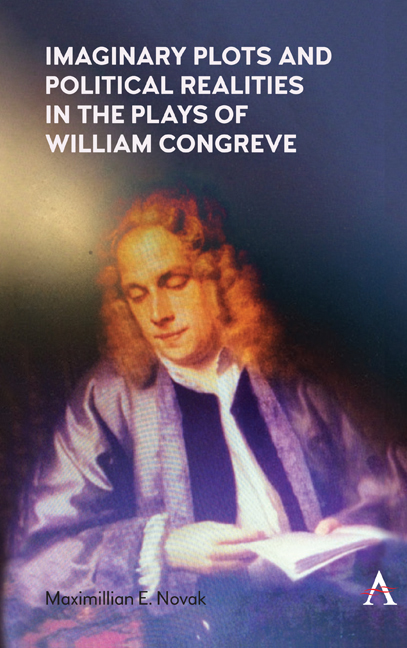Book contents
- Frontmatter
- Contents
- List of Illustrations
- Acknowledgments
- Preface
- 1 The Politics of Love, Marriage, and Scandal in Congreve's World
- 2 Incognita and Some Problems in Morality and Epistemology
- 3 The “Fashionable Cutt of the Town” and William Congreve's The Old Batchelor
- 4 Political and Moral Double Dealing in Congreve's The Double Dealer
- 5 Foresight in the Stars and Scandal in London: Reading the Hieroglyphics in Congreve's Love for Love
- 6 The Failure of Perception and Politics in Congreve's The Mourning Bride
- 7 Politics and Congreve's The Way of the World
- Afterword
- Works Cited
- Index
6 - The Failure of Perception and Politics in Congreve's The Mourning Bride
Published online by Cambridge University Press: 21 July 2020
- Frontmatter
- Contents
- List of Illustrations
- Acknowledgments
- Preface
- 1 The Politics of Love, Marriage, and Scandal in Congreve's World
- 2 Incognita and Some Problems in Morality and Epistemology
- 3 The “Fashionable Cutt of the Town” and William Congreve's The Old Batchelor
- 4 Political and Moral Double Dealing in Congreve's The Double Dealer
- 5 Foresight in the Stars and Scandal in London: Reading the Hieroglyphics in Congreve's Love for Love
- 6 The Failure of Perception and Politics in Congreve's The Mourning Bride
- 7 Politics and Congreve's The Way of the World
- Afterword
- Works Cited
- Index
Summary
When Aubrey Williams argued that Congreve's tragedy, The Mourning Bride, echoed the Christian morality that was part of the English religious environment of the time, the only doubters might have been those who continued to follow Jeremy Collier's questionable attempt to show that the play was “a mere Rant of smut and profainness.” But it was mostly Congreve's comedies that drew Collier's attention. And it was with these works that Williams had his major task in showing an overall attention to Christian themes— a task that raised eventual objections that were overwhelming in their rejection of what amounted, by extension, to a thesis— a thesis that seemed capable of extending to all the literature of the Restoration. As Julia Stone Peters summed up the controversy, had Williams offered his argument as a corrective to seeing the Restoration as a period of complete dissoluteness and ribaldry in life and on the stage, it would have met general approbation. It was by extending his arguments to a point that would have made the Restoration into just another unexceptional period of Christian belief, little different from, say, the fifteenth or the early seventeenth century, Peters argued, that he met resistance from many of the knowledgeable scholars of the period. On the other hand, The Mourning Bride evokes Providence often enough to leave it outside the equation.
The question about The Mourning Bride, then, is whether, allowing for a strong strain of belief in the triumph of a moral scheme governing earthly actions, such a scheme does not exist alongside other ways of seeing human experience that are specifically tied to the political and intellectual milieu of the time in which it was written. For example, Williams pointed out that the play is shrouded in darkness— a darkness of tombs and dungeons. Williams perceived in this a standard Christian view of the human condition, quoting William Sherlock's comment, “we live in the dark, and know not what is good for ourselves”; and again as an example of human blindness, “we are saved and made happy by what we feared.” These quotations come from William Sherlock's A Discourse Concerning the Divine Providence (1694).
- Type
- Chapter
- Information
- Publisher: Anthem PressPrint publication year: 2020



